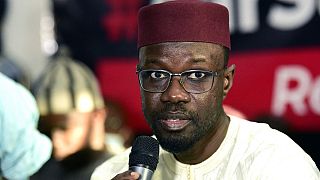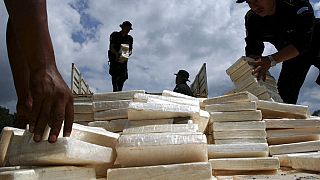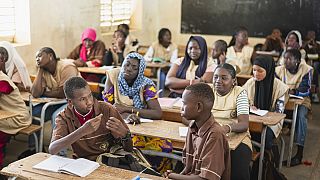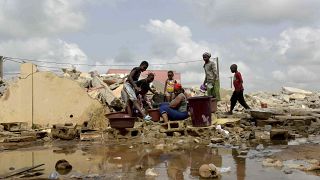Senegal
Standing in a barren schoolyard surrounded by baobab trees at the end of a dusty road in central Senegal, Leila Sy takes a look around and smiles.
"The light makes all the difference," she says. "Everything is beautiful -- the colour, the people, the energy."
The film director is shooting "Banlieusard 2", the sequel to a 2019 French hit starring French rapper Kery James.
The movie is scheduled for release on Netflix later this year.
The American streaming giant is making its mark in francophone West Africa, part of a broader surge in audiovisual production in the region following years of sluggishness.
Outside Nollywood in anglophone Nigeria, production has been rising fast, driven by Senegal and Ivory Coast.
On the "Banlieusard 2" set, it is the last day of filming. The cast and crew are tired -- and ready for a hearty lunch of yassa chicken, a traditional Senegalese dish.
"The teams are there, the skills are there, Senegal is in the process of repositioning itself in this ecosystem and offers a possibility to international producers to come and develop projects without worries", said Ousmane Fall, a co-producer on the picture.
- Soap operas -
In a cramped room of a medical clinic in Senegal's capital Dakar, a smaller but equally motivated team is busy finishing filming an episode of the television series "Karma", broadcast locally on the TFM channel.
The whole team learned the trade on the job.
Souleymane Camara, 29, an actor in the series, works for Marodi, a major regional production company.
Launched in 2015, the company -- which produced the hit series "Mistress of a Married Man" -- has gained more than 4.8 million subscribers on YouTube and claims to have more than 20 million views each month.
Its business model is based on local content and advertising spots that generate millions of views.
Fifty-six percent of its viewers are women, and 70 percent are aged 18 to 34.
Marodi's partnerships with Senegalese TV channels and international distributors such as Canal+ and Amazon Prime have boosted its visibility.
"Marodi's ambition is to be a content producer for all of Africa and the diaspora," Julia Cabrita Diatta, its sales and marketing director, told AFP.
Today, 60 percent of its consumers are in Senegal, 20 percent are elsewhere in Africa and eight percent are in France, she said.
"In French-speaking Africa, we are seeing a take-off in quantity production, driven by Senegal and Ivory Coast, and budgets that have increased enormously", said Pierre Barrot, audiovisual program manager at the International Organization of La Francophonie (OIF).
Between 1992 and 2017, there were only a dozen 52-minute episodes of TV series made in francophone Africa, according to the OIF.
But that rocketed to around 100 episodes between 2018 and 2022, driven mainly by Canal+ and TV5 Monde, which distribute the shows regionally.
Still, the 52-minute format remains less popular than the classic 26 minutes, which tend to fall into the category of police comedies or sitcoms with family-related themes -- often the polygamy/adultery-inheritance-witchcraft triptych, Barrot said.
- New wave -
Unlike Nigeria, French-speaking Africa produces very few feature-length films for TV, and few films for cinematic release.
Last year, "Les Trois Lascars" (The Three Lascars) by Burkinabe director Boubakar Diallo became the most successful cinema release from francophone Africa so far this century.
It notched up 56,652 paid admissions across 12 countries -- an encouraging tally, but a pale shadow of the 1990s, when the region's top box office hit drew half a million cinema-goers.
That was before the cinemas across French-speaking Africa went into headlong decline, and most of them closed.
Today, though, cinemas are coming back and this could prompt an uptick in local production of comedies, Barrot said.
A new generation of audiovisual makers is also emerging to meet demand.
The French school Kourtrajme opened in Dakar in 2022 to train screenwriters and directors.
Its students appear confident about the future and the need to be multi-skilled and adaptable.
"We've never had so many series, and soon, it will go even further," said Kenza Madeira, 23, who wants to become both an actor and a director.
"Personally, I'm very positive -- lots of opportunities are coming."











01:17
US: Halle Berry reflects on how to get people back to movie theatres
02:20
Remake of 'Don’t Tell Mom the Babysitter’s Dead' released this week
01:11
UK man runs the length of Africa in 10,000 miles and 352 days
00:59
British man running length of Africa nears finish line
00:47
We are working on ways to support drought-hit African countries- IMF
01:35
Morocco: Rabab Cheddar chases Olympic dreams while fasting Ramadan